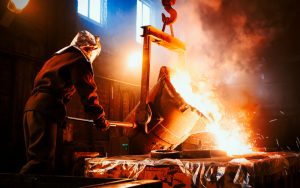The Occupational Safety and Health Administration (OSHA) cited Republic Steel for one repeat, seven serious, and three other-than-serious safety violations, seeking a proposed $220,399 in penalties. According to the agency, Republic’s Canton, Ohio, automotive steel mill did not install adequate machine guarding, implement lockout/tagout measures, or train workers on safety procedures, exposing its employees to amputation hazards.
The agency placed the company in its Severe Violator Enforcement Program (SVEP). SVEP procedures include enhanced follow-up inspections and nationwide inspections of related facilities. The agency previously cited Republic Steel for earlier lockout/tagout violations in 2017.
“Republic Steel is well aware of their responsibility to ensure safety procedures are followed, yet once again, they’ve failed to do so,” OSHA’s Cleveland Area Director, Howard Eberts, said in an agency statement.
“To avoid amputations and other severe injuries,” Eberts continued, “employers must install safety guards on machines and train workers on how to control hazardous energy and avoid coming in contact with operating machine parts.”
OSHA’s lockout/tagout and machine guarding standards perennially show up on the agency’s list of top 10 most frequently cited standards. The Bureau of Labor Statistics (BLS) noted that 58% of the 3,500 workplace amputations reported in 2018 involved machine hazards.
The OSHA compliance safety and health officer (CSHO) inspecting the Canton facility found the employer failed to ensure that:
- Employees tasked with servicing and maintaining equipment at the facility had received training in lockout/tagout (the control of hazardous energy).
- Energy-isolating devices needed to control the energy to machinery or equipment were physically located and operated in such a manner as to isolate the machine or equipment.
- Lockout or tagout devices were affixed to each energy-isolating device by authorized employees.
- One or more methods of machine guarding were provided to protect the operator and other employees in the machine area from hazards such as those created by machine operation, ingoing nip points, rotating parts, flying chips, and sparks.
- Effective machine guarding was in place to protect employees from the ingoing nip points of the numerous belt and pulley systems.
Agency inspectors also determined the company did not train workers to operate cranes and forklifts adequately, failed to repair damaged cranes and follow safe electrical work practices, and exposed workers to slip and fall hazards.
According to OSHA, the employer failed to ensure that employees tasked with operating the Hyster Fork Truck were trained in the safe use and operation of the vehicle before operating it. An employee assigned from one department to another department was tasked with operation of the vehicle without supervision or having completed a training program. An employee tasked with operating a crane had not received any formal training from the employer. The cab of a crane contained multiple glass windows that were shattered or cracked, impairing the vision of operators.
Republic Steel, based in Canton, is a subsidiary of Grupo Simec of Guadalajara, Mexico; employs more than 2,000 workers; and manufactures steel bars and other products for use in machinery, cars, trucks, and other vehicles, according to the agency.

